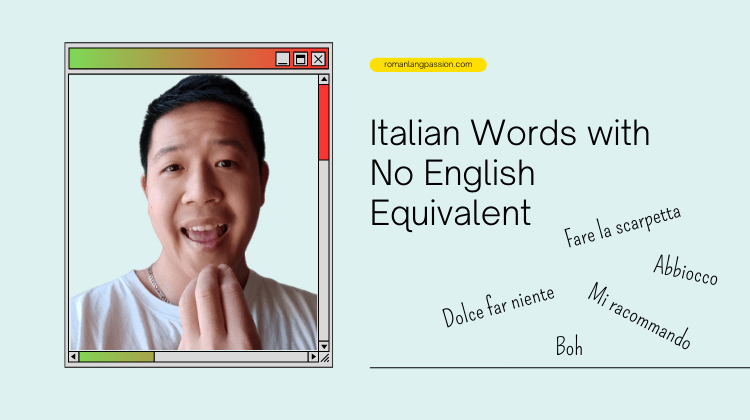👋 Ciao belli! Are you tired of speaking the same old English words and phrases? Do you want to impress your friends with some cool Italian expressions? Well, you’re in luck because we’ve put together a list of 20 amazing Italian words that don’t exist in English. From expressing love to describing the pleasure of doing nothing, these words will add some flair to your vocabulary. Quindi, andiamo!
1. Fare la scarpetta
Literally, it means “to make the little shoe,” but it refers to the act of using a piece of bread to mop up the sauce or gravy left on the plate after eating pasta or a main course.
Example: La pasta al sugo è così buona che ho fatto la scarpetta con il pane per non sprecare nemmeno una goccia di salsa.
The pasta with tomato sauce is so good that I used the bread to “fare la scarpetta” and not waste even a drop of sauce.
2. Ti voglio bene
This is a way of saying “I love you,” but it’s less intense and more appropriate for expressing affection between family members, close friends, or romantic partners who are not yet ready to say “ti amo.”
Example: Ti voglio bene, Italia. I love you, Italy
3. Pantofolaio/a
This noun describes someone who prefers to stay at home and relax rather than go out and socialize. Additionally, in French, we use the adjective “casanier” or “caseiro” in Portuguese. You can see the prefix “casa” in 2 words which means house in Portuguese, Spanish and Italian.
Example: Mia sorella è diventata un po’ pantofolaia dopo la gravidanza, ma è giusto che si prenda del tempo per sé stessa.
My sister has become a bit of a “pantofolaia” after her pregnancy, but it’s important that she takes some time for herself.
4. Fare un giro
This means “to take a walk” or “to go for a ride,” and it can refer to a leisurely stroll around town or a more formal outing to see the sights.
“ Fare un giro” a common leisurely activity, which does reflect Italian culture and the love for spending time together with family and friends. Italians often enjoy taking walks or going for a ride around town to socialize and spend time with each other.
Example: Dopo cena, facciamo un giro per il centro storico della città.
After dinner, let’s take a walk around the historical center of the city.
5. Mammoni
This is a colloquial term for Italian men who live at home with their mothers even after they’ve grown up and started working. It is often used in a humorous or mocking way, but it also reflects a real cultural phenomenon in Italy, where family ties are strong and living with parents well into adulthood is not uncommon.
There are several reasons why Italian men may choose to live at home with their mothers. One reason is economic, as the cost of living in Italy can be quite high, and it may be difficult for young people to afford to live independently.
Example: Molti giovani italiani sono considerati ‘mammoni’, perché spesso vivono con i loro genitori fino a un’età avanzata.
Many young Italians are considered ‘mammoni’, because they often live with their parents until a late age.
6. Bella/Brutta figura
Literally, these phrases mean “beautiful/ugly figure,” but they refer to the impression that someone makes on others through their behavior, appearance, or manners. For instance, you can bring a wine bottle to a “cena” with your friend, it could be considered to be “bella figura”
Example: Se parli con un tono arrogante davanti a tutti, farai una brutta figura.
If you speak with an arrogant tone in front of everyone, you’ll make a bad impression.
7. Abbiocco
This is the feeling of drowsiness or sleepiness that comes over you after a big meal, especially one that includes pasta or other carbohydrates.
Example: Dopo aver mangiato quella abbondante cena, mi è venuto un forte abbiocco.
After eating that abundant dinner, I had a strong feeling of drowsiness and sleepiness.
8. Boh
This is an interjection that is used to express confusion or uncertainty, similar to the English phrase “I don’t know.” This is my favorite Italian word. In fact, I often use “boh” even while speaking in English.
Example: Boh, non ho idea di come risolvere questo problema.
I don’t know, I have no idea how to solve this problem.
9. Mi racommando
This is a phrase that is used to ask someone to take care of something for you or to remind them of a request that you’ve made previously.
Example: Non dimenticare di comprare il pane quando vai al supermercato, mi raccomando.
Do not forget to buy bread when you go to the supermarket, please.
10. Furbo
This adjective describes someone who is clever and smart often in a both negative and positive way. I don’t think, in English, we have an equivalent. “Furbo” in Italian is similar in meaning to “malin” in French and “malandro” in Portuguese.
Example: Non ti fidare di quell’uomo, è molto furbo e potrebbe ingannarti.
Do not trust that man, he is very clever ( not really) and he could deceive you.
11. Essere disponibile
This means “to be available” or “to have time,” and it’s often used in the context of scheduling appointments or making plans. Again, we can see the Italians value spending time with family and friends, and being available to spend time with loved ones is important to them
Example: Sono sempre disponibile ad aiutarti, basta che mi chiedi.
I’m always available to help you, just ask me.
12. Ma figurati
This is an expression that means “don’t mention it” or “forget about it” and it’s often used to downplay a favor or kind gesture. The same expression in Portuguese is “ imagina” or in French is “je vous en prie”. Which as expressions are very nice!
Example:
Minh: Mi scuso per il ritardo, spero di non aver fatto aspettare troppo. I apologize for the delay, I hope I didn’t keep you waiting too long.
Sara: Ma figurati, non ti preoccupare, sono appena arrivato anch’io. Don’t worry about it, I just got here too.
13. Ci mancherebbe
Ci mancherebbe” is an Italian expression that roughly translates to “Of course not” or “Don’t mention it” in English. It is used to convey the idea that something is not a problem or inconvenience at all, and that it is completely fine or acceptable.
For instance, if someone says “Grazie per il tuo aiuto” Thank you for your help, you could respond “Ci mancherebbe” to mean “Don’t mention it” or “It was no trouble at all”.
14. Dolce far niente
“Dolce far niente” means “sweet doing nothing,” and it perfectly captures the feeling of laziness and relaxation. Just imagine yourself on a beautiful afternoon, doing nothing but enjoying the moment. It’s a feeling that’s hard to put into words, but when you experience it, you know it’s special. It’s also my favorite expression, I use this one quite often in English conversation with my friends.
The concept has been around for over two thousand years, and Italians have truly mastered the art of it. When you hear someone sigh and say “ah… dolce far niente,” you know they’re fully embracing the joy of doing absolutely nothing.
Example: Oggi ho deciso di dedicare il pomeriggio al dolce far niente e rilassarmi in giardino.
Today I decided to dedicate the afternoon to “dolce far niente” and relax in the garden.
15. Spaghettata
This is a noun that describes a casual meal or gathering where the main dish is spaghetti, often served with a simple tomato sauce and accompanied by bread and wine. Add a photo of let’s have a spashetti
Example: Invitiamo alcuni amici stasera per una spaghettata. We’re inviting some friends tonight for spaghettata.
16. Apericena
This is a combination of two words, aperitivo (an Italian tradition of having a pre-dinner drink and snack) and cena (dinner), and it refers to a light meal or buffet that is served in the early evening as a substitute for a full dinner.
Apericena has become a popular activity in major Italian cities. If you’re invited to one on a Thursday or Friday evening, you can accept with confidence, now that you know the meaning of this unique Italian word!
Example: Oggi sera andiamo al bar per prendere un apericena. Tonight we’re going to the bar to have an apericena.
17. Gattara
This is a noun that describes a woman who loves cats and often takes care of feral or stray cats in her neighborhood. In my opinion, this is a pretty weird Italian word that I never thought existed
Example: La signora Rossi è una vera gattara, ha adottato e curato più di venti gatti randagi.
Mrs. Rossi is a true “gattara,” she has adopted and taken care of more than twenty stray cats
18. Mica
Mica” is an Italian adverb that is often used to convey a sense of negation or doubt, that can be translated as “not at all,” “hardly,” or “by no means,” depending on the context.
Example: Non mi piace mica questa cena. I don’t like this dinner at all.
19. Al boca di lupo
This is a phrase that is used to wish someone good luck, similar to the English “break a leg.” Literally, it means “into the wolf’s mouth.” Honestly, I don’t understand why Italians say that, even I tried to find the origin of the expression on Google, but haizz…
Example: In bocca al lupo per il tuo colloquio di lavoro! Good luck with your job interview!
20. Menefesghita
“Menefreghista” is a noun that comes from “Non me ne frega” which means “I don’t care”. It’s used to describe someone who doesn’t care about a particular issue or topic. People usually use it in a mean way to criticize someone for not giving a damn or not taking any action on something. If you say boh all the time, you’re definitely a “menefesghita”
Example: Non capisco perché il mio capo sia così menefreghista riguardo alla situazione degli impiegati.
I don’t understand why my boss is so indifferent about the employees’ situation.

Also interesting: Why Italian is considered the Most Beautiful Language?
So, there you have it, folks! 20 amazing Italian words that you can start using today to spice up your conversations. Whether you’re a fan of Italian cuisine, culture, or just looking to impress your friends with some new expressions, these words are sure to do the trick.
So why not try out “fare la scarpetta” at your next Italian dinner, or describe your lazy weekend with “dolce far niente”? With these expressions, you’ll be speaking like a true Italian in no time. Ciao!











This Post Has 2 Comments
Saved as a favorite, I love your blog!
Thanks!